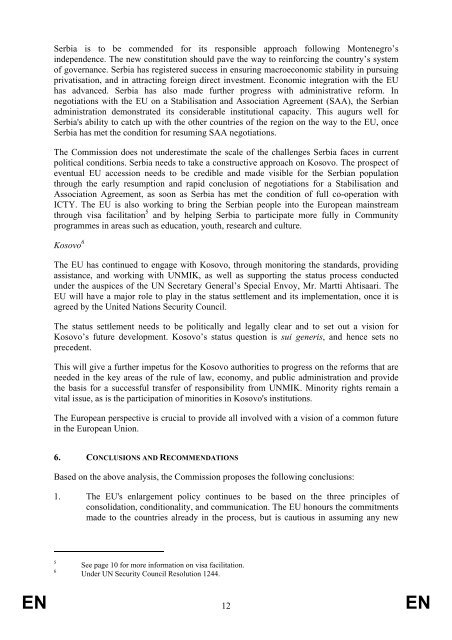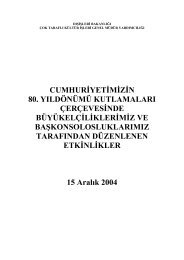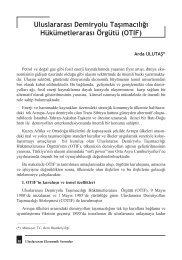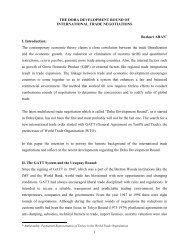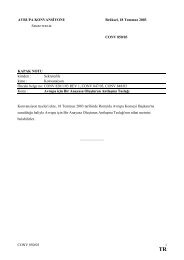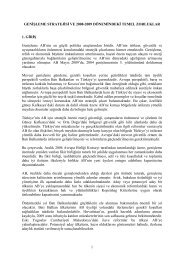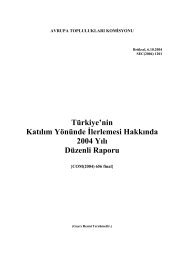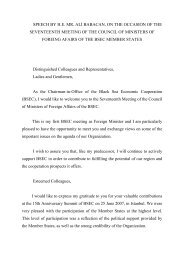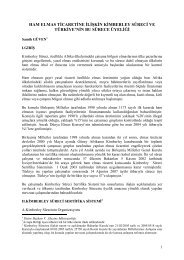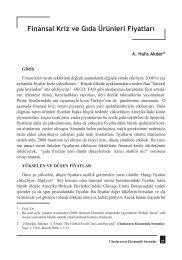Enlargement Strategy and Main Challenges 2006 - 2007
Enlargement Strategy and Main Challenges 2006 - 2007
Enlargement Strategy and Main Challenges 2006 - 2007
Create successful ePaper yourself
Turn your PDF publications into a flip-book with our unique Google optimized e-Paper software.
Serbia is to be commended for its responsible approach following Montenegro’s<br />
independence. The new constitution should pave the way to reinforcing the country’s system<br />
of governance. Serbia has registered success in ensuring macroeconomic stability in pursuing<br />
privatisation, <strong>and</strong> in attracting foreign direct investment. Economic integration with the EU<br />
has advanced. Serbia has also made further progress with administrative reform. In<br />
negotiations with the EU on a Stabilisation <strong>and</strong> Association Agreement (SAA), the Serbian<br />
administration demonstrated its considerable institutional capacity. This augurs well for<br />
Serbia's ability to catch up with the other countries of the region on the way to the EU, once<br />
Serbia has met the condition for resuming SAA negotiations.<br />
The Commission does not underestimate the scale of the challenges Serbia faces in current<br />
political conditions. Serbia needs to take a constructive approach on Kosovo. The prospect of<br />
eventual EU accession needs to be credible <strong>and</strong> made visible for the Serbian population<br />
through the early resumption <strong>and</strong> rapid conclusion of negotiations for a Stabilisation <strong>and</strong><br />
Association Agreement, as soon as Serbia has met the condition of full co-operation with<br />
ICTY. The EU is also working to bring the Serbian people into the European mainstream<br />
through visa facilitation 5 <strong>and</strong> by helping Serbia to participate more fully in Community<br />
programmes in areas such as education, youth, research <strong>and</strong> culture.<br />
Kosovo 6<br />
The EU has continued to engage with Kosovo, through monitoring the st<strong>and</strong>ards, providing<br />
assistance, <strong>and</strong> working with UNMIK, as well as supporting the status process conducted<br />
under the auspices of the UN Secretary General’s Special Envoy, Mr. Martti Ahtisaari. The<br />
EU will have a major role to play in the status settlement <strong>and</strong> its implementation, once it is<br />
agreed by the United Nations Security Council.<br />
The status settlement needs to be politically <strong>and</strong> legally clear <strong>and</strong> to set out a vision for<br />
Kosovo’s future development. Kosovo’s status question is sui generis, <strong>and</strong> hence sets no<br />
precedent.<br />
This will give a further impetus for the Kosovo authorities to progress on the reforms that are<br />
needed in the key areas of the rule of law, economy, <strong>and</strong> public administration <strong>and</strong> provide<br />
the basis for a successful transfer of responsibility from UNMIK. Minority rights remain a<br />
vital issue, as is the participation of minorities in Kosovo's institutions.<br />
The European perspective is crucial to provide all involved with a vision of a common future<br />
in the European Union.<br />
6. CONCLUSIONS AND RECOMMENDATIONS<br />
Based on the above analysis, the Commission proposes the following conclusions:<br />
1. The EU's enlargement policy continues to be based on the three principles of<br />
consolidation, conditionality, <strong>and</strong> communication. The EU honours the commitments<br />
made to the countries already in the process, but is cautious in assuming any new<br />
5 See page 10 for more information on visa facilitation.<br />
6 Under UN Security Council Resolution 1244.<br />
EN 12 EN


